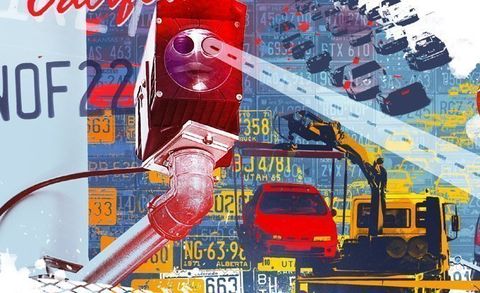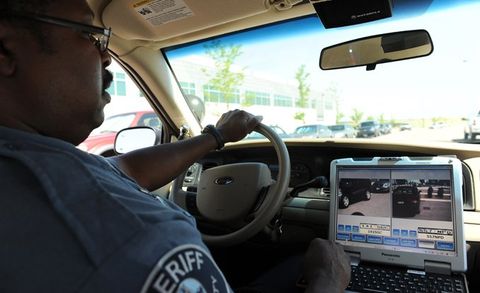How To Hide A Camera From Lisence Plate Scanners
Towing companies are a necessary evil when it comes to parking enforcement and property repossession. But in the Google Earth nosotros at present inhabit, tow trucks exercise more merely yank cars out of loading zones. They use license-plate readers (LPRs) to assemble a detailed profile of where your car volition be and when. That's an unnecessary evil.
Plate readers have long been a tool of law enforcement, and police officers swear by them for tracking stolen cars and apprehending unsafe criminals. Simply individual companies, such as repo crews, likewise photograph millions of plates a day, with scanners mounted on tow trucks and even on purpose-built camera cars whose sole mission is to bulldoze around and collect plate scans. Each scan is GPS-tagged and stamped with the appointment and fourth dimension, feeding a massive data trove to any law-enforcement agency—or government-canonical individual manufacture—willing to pay for it.
You've probably been tagged at the office, at a mall, or fifty-fifty in your own driveway. And the companies that sell specialized monitoring software that assembles all these sightings into a reliable profile stand to profit hugely. Brian Hauss, a legal boyfriend for the American Civil Liberties Union (ACLU), says: "The whole signal is so yous can effigy out somebody's long-term location. Unless there are limits on how those transactions tin can be processed, I call up it'south just a matter of fourth dimension until there are meaning privacy violations, if they oasis't already occurred."
How Is This Fifty-fifty Legal? License-plate-reader companies don't have access to DMV registrations, and so while they can rails your auto, they don't know it's yours. That information is guarded by the Driver's Privacy Protection Act of 1994, which keeps your proper noun, address, and driving history from public view. Mostly. At that place are enough of exceptions, including for insurance companies and private investigators. LPR companies say only two groups can employ its software to find the person behind the plate: police-enforcement agencies and repossession companies. In add-on, the encrypted databases keep a log of each plate search and permit the ability to restrict access.
The companies that push plate readers savour unregulated autonomy in almost states. Vigilant Solutions of California and its partner, Texas-based Digital Recognition Network, boast at least ii billion license-plate scans since starting the country's largest private license-plate database, the National Vehicle Location Service, in 2009.
In total, there are at least three billion license-plate photos in private databases. Since many are duplicates and never deleted, analytics can paint a bright picture show of any motorist. Predicting where and when someone will drive is relatively easy; software tin can sort how many times a machine is spotted in a certain area and, when fed plenty data, tin generate a person's driving history over time.
Yous Tin't Run, But They Can Hibernate
An average license-plate reader looks similar four radar detectors, stacked 2-by-two. But they aren't always easy to spot. Both cops and private users hide LRPs in almost anthing.
And the systems are getting smarter chop-chop. Vigilant alone adds 100 million photos every month, but company marketing vice president Brian Shockley says the discussion "tracking" is misleading. LPRs, he says, capture "momentary, point-in-time" information.
"LPR is never a smoking gun," says Shockley. "Merely because a car is somewhere doesn't mean the registered owner is with the car." And yet, Digital Recognition Network's website says of its services, "Owners are typically inside 1000 feet of the vehicle, so find the vehicle and you notice the customer."
Scott Jackson, CEO of information provider MVTrac, contends that license-plate readers just automate what police officers and repo men accept always done—run plates past eye—and that most Americans accept accustomed that the days of having true privacy are gone.
"The pros of this technology far, far outweigh the fear cistron of privacy," he says, referring to its successful police busts. "In that location are so many ways to rail a person; this is not the 1 you should be worried about."
Hauss of the ACLU disagrees. He asks, "Is it just so you can have a giant haystack that you can search whenever yous desire, for whatsoever purpose y'all want?"
*We read each of the bills to judge their language on information security every bit it might best protect citizens. We rated as "Strong" those that specified the most detailed, far-reaching data policies emphasizing personal privacy. "Moderate" means the law contains fewer specifics or intends to institute a policy in the hereafter but is yet sufficient. "Minimal" means the legislation is weak at protecting data, and "None" gives information technology zilch regard.
Paul Kulas, president of Colorado-based BellesLink, which sells verification software to repo companies, says his industry needs to face these public concerns before it'southward "lumped in with the surveillance land." Some privacy statements by plate-reader companies, he says, take been misleading.
Kulas believes that the idea that LPR data cannot exist linked to personal information is inaccurate. "Without regulation and without foresight," he says, "this could get to a point where numerous lawsuits could be brought confronting lenders and camera companies because they have, in effect, obtained our location information without our permission."
Every bit ominous as their private-sector deployment is, LPRs have incited controversy with their police force-enforcement usage as well. In December 2013, the city of Boston suspended its LPR program after police accidentally revealed DMV-tied information from its cameras to the Boston World. While that 1 incident highlighted failings in the department's data policy, plenty of agencies don't fifty-fifty have such a matter. Some keep information for days, others for years. In most states, police tin monitor you with LPRs without serving a search warrant or court guild. And this Feb, a Department of Homeland Security proposal for a privately hosted federal plate-tracking system was scrapped days later on the Washington Post exposed it.
Last twelvemonth, law in Tempe, Arizona, refused an offer from Vigilant for costless LPR cameras. The take hold of: Every month, officers would have to serve 25 warrants from a list supplied by Vigilant. Miss the quota, lose the cameras. Such lists, according to the Los Angeles Times investigation that uncovered the offer, commonly come up from debt-collector "warrants" against drivers with unpaid municipal fines.
Eventually, police and repo men might not exist the only customers buying LPR data. MVTrac recently completed a beta examination that tracked Acuras at specific areas and times, logging info including the exact models and colors. That information, far more real-time than state-registration data, could be gold to automakers, marketers, and insurance companies.
There has been pushback. 9 states accept passed LPR laws, and four of those states bar private companies such every bit Vigilant from operating or selling their wares [see map, above]. Some of those states limit usage to legitimate investigations past police and traffic agencies. And some ready standards for information security and plant formal processes (such as requiring warrants) and public audits.
In 2007, New Hampshire was the first to ban LPRs completely except for toll collections and security on certain bridges. Maine answered in 2009 with a less restrictive law, followed by California, Arkansas, Utah, Vermont, Florida, Tennessee, and Maryland. In Utah, legislators banned individual companies from using LPRs just amended the law after Vigilant and Digital Recognition Network sued the state, claiming the ban violated their First Amendment rights to public photography and gratuitous speech. Later helping to kill a similar nib in California this by May, the companies are at present suing Arkansas, which followed Utah's original letter in restricting LPRs to police employ. At least ix states have pending bills that regulate plate readers.
Equally with many technologies, license-plate readers are advancing at a rate that is outpacing legislation. Smaller cameras; smartphone apps that tin pick out plates from live video; and the potential fusion of public records, DMV databases, and facial-recognition software are all already on the horizon. Because police ostensibly use LPRs for public safety, drivers will likely have to accept some erosion of their privacy behind the wheel. But when corporations starting time buying tracking data in the name of "client focus" and lawmakers expect the other way, we say it'south fourth dimension to bring on the James Bond–style plate flippers.
This content is created and maintained by a third party, and imported onto this folio to help users provide their electronic mail addresses. You may be able to find more information well-nigh this and like content at piano.io
Source: https://www.caranddriver.com/features/a15107616/screen-plate-club-how-license-plate-scanning-compromises-your-privacy-feature/
Posted by: baileybutragreake1938.blogspot.com





0 Response to "How To Hide A Camera From Lisence Plate Scanners"
Post a Comment